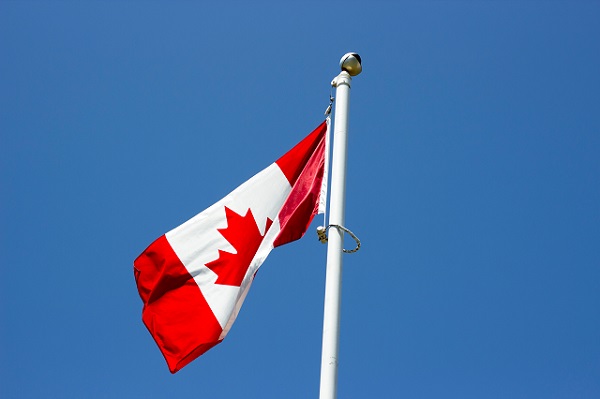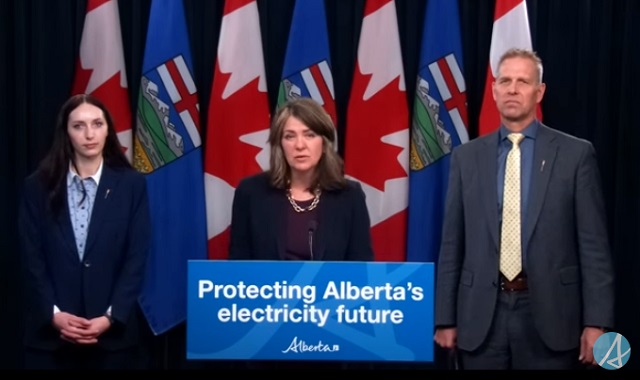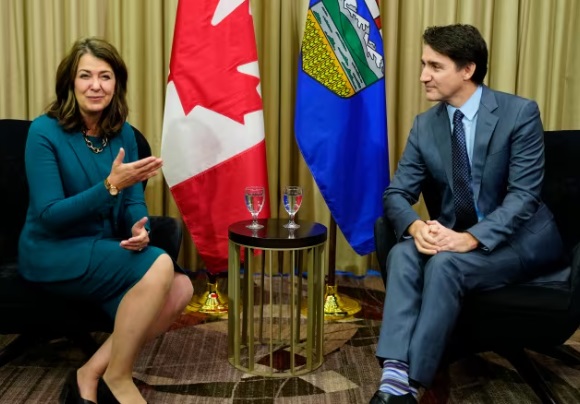Business
Canadian Taxpayer Federation calls on Ottawa to rescind recent Carbon Tax hike

From the Canadian Taxpayer Federation
Ottawa’s carbon tax hike out of step with global reality
by Aaron Wudrick, Federal Director and Franco Terrazzano, Alberta Director
(This column originally appeared in the Financial Post)
Prime Minister Justin Trudeau has chosen to make life more expensive by increasing the federal carbon tax by 50 per cent amidst the COVID-19 economic and health crisis. Meanwhile, governments around the world are moving in the opposite direction because hiking taxes during a global pandemic is a bad idea.
Provinces have already tapped the breaks on their own carbon tax hikes. British Columbia Premier John Horgan announced that he would not be going forward with his planned April 1 carbon tax hike. Instead of mirroring the federal carbon tax hike, Newfoundland and Labrador is maintaining its tax at $20 per tonne. The price of carbon allowances in the Quebec-California cap and trade system have also fallen due to COVID-19 and the current macroeconomic realities.
The European Union’s cap and trade scheme, which applies to 30 countries, has also seen its carbon tax rate drop significantly. For most of 2019 and early 2020, EU carbon prices traded around €25 per tonne before nosediving to around €15 per tonne in March. The EU’s cap and trade carbon tax rate has fallen 32 per cent below its 2020 peak, according to the most recent data available on the ICAP Allowance Price Explorer. While the tax rate has increased since bottoming out, S&P Global Platts Analytics forecasts the COVID-19 shock keeping downward pressure on the cap and trade market.
Other counties are providing further carbon tax relief. The Norwegian government reduced its carbon tax rate on natural gas and liquified petroleum gas to zeroand will keep the rates below the pre-coronavirus level until 2024. Norway also deferred payments on various fuel taxes until June 18.
Estonia Finance Minister Martin Helme formally called for his country to consider leaving the EU’s cap and trade carbon tax system to provide relief. The prime minister later announced that Estonia would not seek to leave the EU’s carbon tax system, but the Estonian government lowered the excise tax on electricity to the minimum allowed by the EU and lowered its excise tax on diesel, light and heavy fuel oil, shale oil and natural gas.
“Due to the economic downturn, both people’s incomes and the revenue of companies are declining, but daily household expenses such as electricity or gas bills still need to be paid. To better cope with them, we are reducing excise duty rates on gas and electricity for two years,” Helme explained.
Outside of the EU, the United Kingdom is saving its taxpayers between £15 and £20 million per year by walking back its plan to increase its carbon tax top-up, New Zealand’s cap and trade tax rate has fallen by more than 20 per cent this year and South Africa pushed back carbon tax payments by three months.
It’s worth noting that it’s unlikely Canada’s carbon tax will have any meaningful impact on global emissions. Only 45 countries (out of 195 countries worldwide) are covered by a carbon tax, and only 15.6 per cent of total emissions are covered by these carbon taxes, according to the World Bank. Furthermore, about half of the emissions covered by carbon taxes are priced below US$10/tCO2e – significantly lower than Canada’s federal rate and too low to make a difference.
With Canada only accounting for 1.5 per cent of global emissions, it’s easy to understand Trudeau’s acknowledgement that, “even if Canada stopped everything tomorrow, and the other countries didn’t have any solutions, it wouldn’t make a big difference.”
Now more than ever, Canadian taxpayers need relief. With carbon tax burdens declining around the globe during the COVID-19 crisis, walking back the recent carbon tax hike should be a no-brainer for our federal government.
Province of Alberta replies to Joe Biden’s promise to cancel Keystone XL
Business
Maxime Bernier warns Canadians of Trudeau’s plan to implement WEF global tax regime

From LifeSiteNews
If ‘the idea of a global corporate tax becomes normalized, we may eventually see other agreements to impose other taxes, on carbon, airfare, or who knows what.’
People’s Party of Canada leader Maxime Bernier has warned that the Liberal government’s push for World Economic Forum (WEF) “Global Tax” scheme should concern Canadians.
According to Canada’s 2024 Budget, Prime Minister Justin Trudeau is working to pass the WEF’s Global Minimum Tax Act which will mandate that multinational companies pay a minimum tax rate of 15 percent.
“Canadians should be very concerned, for several reasons,” People’s Party leader Maxime Bernier told LifeSiteNews, in response to the proposal.
“First, the WEF is a globalist institution that actively campaigns for the establishment of a world government and for the adoption of socialist, authoritarian, and reactionary anti-growth policies across the world,” he explained. “Any proposal they make is very likely not in the interest of Canadians.”
“Second, this minimum tax on multinationals is a way to insidiously build support for a global harmonized tax regime that will lower tax competition between countries, and therefore ensure that taxes can stay higher everywhere,” he continued.
“Canada reaffirms its commitment to Pillar One and will continue to work diligently to finalize a multilateral treaty and bring the new system into effect as soon as a critical mass of countries is willing,” the budget stated.
“However, in view of consecutive delays internationally in implementing the multilateral treaty, Canada cannot continue to wait before taking action,” it continued.
The Trudeau government also announced it would be implementing “Pillar Two,” which aims to establish a global minimum corporate tax rate.
“Pillar Two of the plan is a global minimum tax regime to ensure that large multinational corporations are subject to a minimum effective tax rate of 15 per cent on their profits wherever they do business,” the Liberals explained.
“The federal government is moving ahead with legislation to implement the regime in Canada, following consultations last summer on draft legislative proposals for the new Global Minimum Tax Act,” it continued.
According to the budget, Trudeau promised to introduce the new legislation in Parliament soon.
The global tax was first proposed by Secretary-General of Amnesty International at the WEF meeting in Davos this January.
“Let’s start taxing carbon…[but] not just carbon tax,” the head of Amnesty International, Agnes Callamard, said during a panel discussion.
According to the WEF, the tax, proposed by the Organization for Economic Co-operation and Development (OECD), “imposes a minimum effective rate of 15% on corporate profits.”
Following the meeting, 140 countries, including Canada, pledged to impose the tax.
While a tax on large corporations does not necessarily sound unethical, implementing a global tax appears to be just the first step in the WEF’s globalization plan by undermining the sovereignty of nations.
While Bernier explained that multinationals should pay taxes, he argued it is the role of each country to determine what those taxes are.
“The logic of pressuring countries with low taxes to raise them is that it lessens fiscal competition and makes it then less costly and easier for countries with higher taxes to keep them high,” he said.
Bernier pointed out that competition is good since it “forces everyone to get better and more efficient.”
“In the end, we all end up paying for taxes, even those paid by multinationals, as it causes them to raise prices and transfer the cost of taxes to consumers,” he warned.
Bernier further explained that the new tax could be a first step “toward the implementation of global taxes by the United Nations or some of its agencies, with the cooperation of globalist governments like Trudeau’s willing to cede our sovereignty to these international organizations.”
“Just like ‘temporary taxes’ (like the income tax adopted during WWI) tend to become permanent, ‘minimum taxes’ tend to be raised,” he warned. “And if the idea of a global corporate tax becomes normalized, we may eventually see other agreements to impose other taxes, on carbon, airfare, or who knows what.”
Trudeau’s involvement in the WEF’s plan should not be surprising considering his current environmental goals – which are in lockstep with the United Nations’ 2030 Agenda for Sustainable Development – which include the phasing out coal-fired power plants, reducing fertilizer usage, and curbing natural gas use over the coming decades.
The reduction and eventual elimination of so-called “fossil fuels” and a transition to unreliable “green” energy has also been pushed by the World Economic Forum – the aforementioned group famous for its socialist “Great Reset” agenda – in which Trudeau and some of his cabinet are involved.
Business
Higher Capital Gains Taxes cap off a loser federal budget

From Frontier Centre for Public Policy
By Lee Harding
Even former Liberal Finance Minister Bill Morneau told the Financial Post the capital gains tax increase would be “very troubling for many investors.” He added, “I don’t think there was enough effort in this budget to reduce spending, to create that appropriate direction for the economy.”
New taxes on capital gains mean more capital pains for Canadians as they endure another tax-grabbing, heavy-spending federal deficit budget.
Going forward, the inclusion rate increases to 66 per cent, up from 50 per cent, on capital gains above $250,000 for people and on all capital gains for corporations and trusts. The change will affect 307,000 businesses and see Ottawa, according to probably optimistic projections, rake in an additional $19.4 billion over four years.
A wide chorus of voices have justifiably condemned this move. If an asset is sold for more than it was bought for, the government will claim two-thirds of the value because half is no longer enough. It’s pure government greed.
If you were an investor or a young tech entrepreneur looking for somewhere to set up shop, would you choose Canada? And if you’re already that investor, how hard would you work to appreciate your assets when the government seizes much of the improvement?
Even before this budget, the OECD predicted Canada would have the lowest growth rates in per-person GDP up to 2060 of all its member countries.
In a speech in Halifax on March 26, Bank of Canada senior deputy governor Carolyn Rogers put the productivity problem this way: “You’ve seen those signs that say, ‘In emergency, break glass.’ Well, it’s time to break the glass.”
What can Canadians bash now? Their heads against a wall?
Even former Liberal Finance Minister Bill Morneau told the Financial Post the capital gains tax increase would be “very troubling for many investors.” He added, “I don’t think there was enough effort in this budget to reduce spending, to create that appropriate direction for the economy.”
No kidding. Not since the first Prime Minister Trudeau (Pierre) have Canadians been able to count so reliably on deficit spending, higher expenditures, and more taxes.
Long ago, it seems now, when Justin Trudeau was not yet prime minister, he campaigned on “a modest short-term deficit” of less than $10 billion for each of the first three years and a balanced budget by the 2019-2020 fiscal year.
His rationale was that low interest rates made it a rare opportunity to borrow and build infrastructure, all to encourage economic growth. Of course, the budget never balanced itself and Canada has lost $225 billion in foreign investment since 2016.
The deficits continue though the excuse of low interest rates is long gone. Despite higher carbon and capital gains taxes, this year’s deficit will match last year’s: $40 billion. Infrastructure seems less in view than an ever-expanding nanny state of taxpayer-funded dental care, child care, and pharmacare.
Of course, the Trudeau deficits were not as modest as advertised, and all-time federal debt has doubled to $1.2 trillion in less than a decade. Debt interest payments this coming fiscal year will be $54.1 billion, matching GST revenue and exceeding the $52 billion of transfers to the provinces for health care.
In 1970, columnist Lubor Zink quoted Pierre Trudeau as saying, “One has to be in the wheelhouse to see what shifts are taking place . . . The observer . . . on the deck . . . sees the horizon much in the same direction and doesn’t realize it but perhaps he will find himself disembarking at a different island than the one he thought he was sailing for.”
Like father, like son, Justin Trudeau has captained Canada to a deceptive and unwelcome destination. What started as Fantasy Island is becoming Davy Jones’ Locker.
Lee Harding is a Research Fellow at the Frontier Centre for Public Policy
-

 COVID-1915 hours ago
COVID-1915 hours agoWHO Official Admits the Truth About Passports
-

 COVID-192 days ago
COVID-192 days agoJapanese study finds ‘significant increases’ in cancer deaths after third mRNA COVID doses
-

 Alberta11 hours ago
Alberta11 hours agoProvince to stop municipalities overcharging on utility bills
-

 Brownstone Institute2 days ago
Brownstone Institute2 days agoPfizer Lied to Us Again
-

 Brownstone Institute2 days ago
Brownstone Institute2 days agoDid Lockdowns Set a Global Revolt in Motion?
-

 Brownstone Institute2 days ago
Brownstone Institute2 days agoIs the Overton Window Real, Imagined, or Constructed?
-

 Frontier Centre for Public Policy1 day ago
Frontier Centre for Public Policy1 day agoThe tale of two teachers
-

 Alberta20 hours ago
Alberta20 hours agoAlberta moves to protect Edmonton park from Trudeau government’s ‘diversity’ plan








